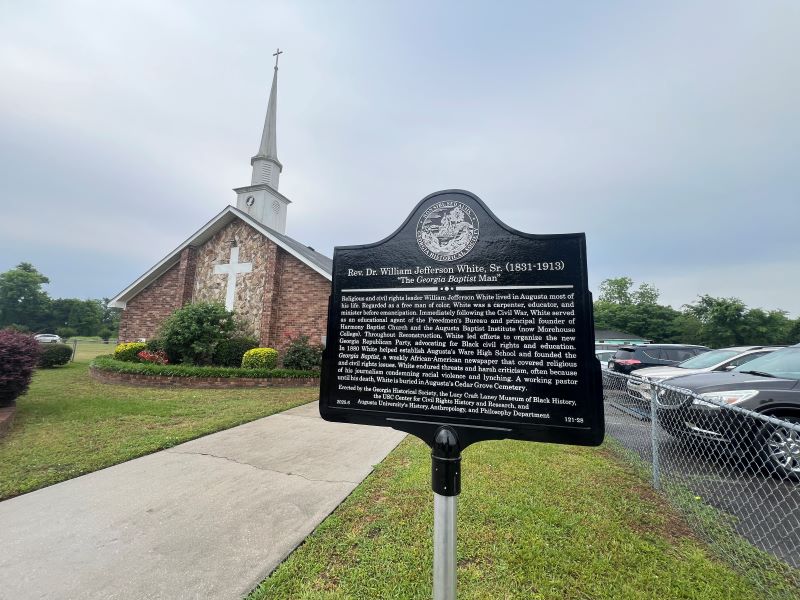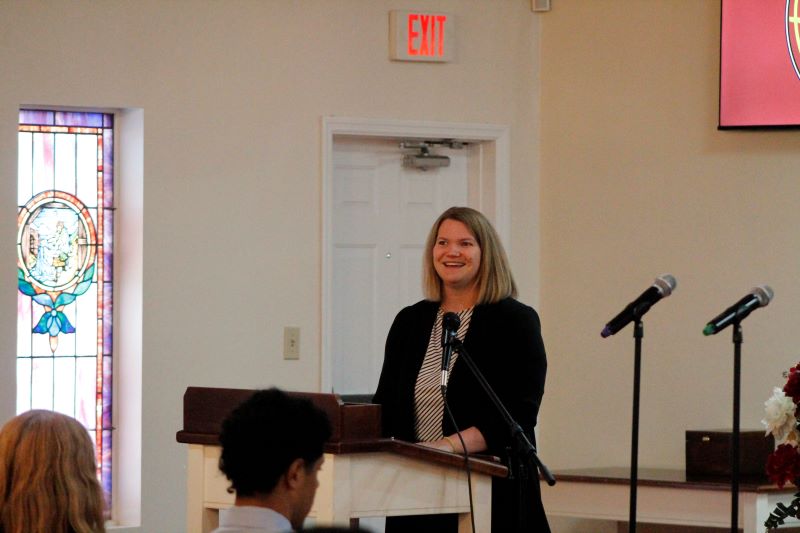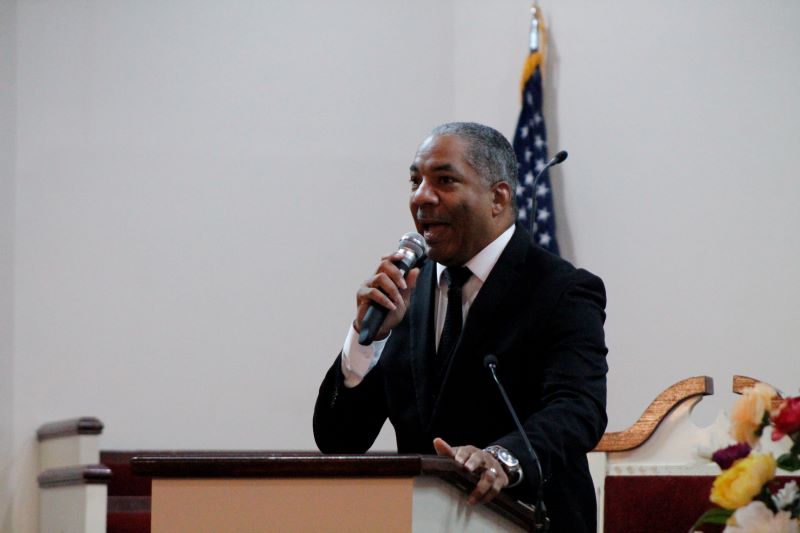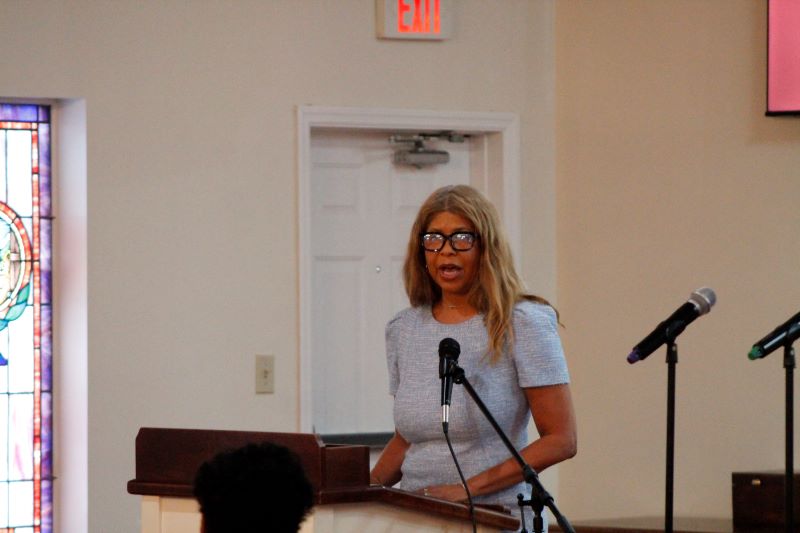
Augusta, GA, May 8, 2025—The Georgia Historical Society (GHS) dedicated a new historical marker in Augusta on May 8, 2025, about local religious and civil rights leader Rev. Dr. William Jefferson White, Sr. (1831-1913). The historical marker was dedicated in partnership with the Lucy Craft Laney Museum of Black History, the USC Center for Civil Rights History and Research, and Augusta University's History, Anthropology, and Philosophy Department. Although Rev. Dr. William Jefferson White, Sr., lived in Augusta most of his life, his religious ministry and activism for Black civil rights and education is tangible statewide today.
“Rev. Dr. White was a vocal lifelong leader who created spaces for African Americans to worship, gain an education, and discuss civil rights issues,” said Breana James, Historical Marker and Program Associate, GHS. “The Georgia Historical Society is pleased to erect a historical marker that shares his life and impact, adding to our history that is shared through the statewide program.”
The Augusta-based leader was instrumental in establishing many institutions in the city and Georgia that fostered Black civil rights and education. The marker details how White helped establish Ware High School, the Augusta Baptist Institute (now Morehouse College), Harmony Baptist Church, and the Georgia Baptist, a weekly African-American newspaper. Known as “the Georgia Baptist Man,” White used the newspaper to cover religious and civil rights issues. White endured threats and harsh criticism, often as a direct result of his condemnation of racial violence and lynching.
“The cultural fabric of Richmond County is made up of so many compelling stories,” said Corey Rogers, Executive Director, the Lucy Craft Laney Museum of Black History and Conference Center. “Through the Georgia Historical Society’s state marker program, we are able to tell the remarkable story of Rev. Dr. William Jefferson White and so many others like him.”
“Rev. Dr. White devoted his entire life to education and equal rights for Black Georgians and Augustans, even if—as shown in his anti-lynching journalism—it put him in danger,” said Dr. Melissa DeVelvis, Assistant Professor, Augusta University's History, Anthropology, and Philosophy Department. “It’s exciting to see a marker commemorating that life here at a church he helped found.”
Rogers and Dr. DeVelvis jointly applied for this historical marker through GHS’s annual application process. Dr. DeVelvis invited one of her classes to participate, allowing them to research and gather the necessary materials for the application and learn about White and the history of their University’s city through hands-on experience.
“As someone whose earliest memories of faith and community are rooted in Harmony Baptist Church, Rev. Dr. William Jefferson White’s image is etched in my childhood,” said Dr. Bobby Donaldson, Historian and Executive Director, Center for Civil Rights History and Research at the University of South Carolina. “Long before I fully understood his legacy, I was shaped by the enduring presence of his vision. It is deeply fitting that a historical marker stand on the site of Harmony Baptist, honoring his extraordinary contributions as a minister, journalist, educator, and public servant. Rev. Dr. White was a true builder—of churches, of institutions, and of futures. He founded Harmony Baptist Church and helped establish the Augusta Baptist Institute—now Morehouse College—planting seeds of leadership, scholarship, and empowerment across generations. This marker is a long-overdue recognition of his wide-reaching impact, not only in Augusta but throughout Georgia.”



Dr. Melissa DeVelvis (top); Rev. Carl Simmons (middle); Bonnie Blocker (bottom) speaking at the historical marker dedication.
The marker dedication took place at Harmony Baptist Church. In addition to James, Rogers, Dr. DeVelvis, and Dr. Donaldson, speakers included Mike Sanders, former student of Dr. DeVelvis; Ariel Harper, former student of Dr. DeVelvis; Russell Joel Brown, alumnus, Morehouse College; Rev. Hardy Bennings III, Pastor, Historic Springfield Baptist Church; Rev. Carl Simmons, Pastor, Harmony Baptist Church; Joyce Law, Georgia African American Historic Preservation Network; and Bonnie Blocker, great-great granddaughter of Rev. Dr. William Jefferson White.
The marker text reads:
Rev. Dr. William Jefferson White, Sr. (1831-1913)
“The Georgia Baptist Man”
Religious and civil rights leader William Jefferson White lived in Augusta most of his life. Regarded as a free man of color, White was a carpenter, educator, and minister before emancipation. Immediately following the Civil War, White served as an educational agent of the Freedmen’s Bureau and principal founder of Harmony Baptist Church and the Augusta Baptist Institute (now Morehouse College). Throughout Reconstruction, White led efforts to organize the new Georgia Republican Party, advocating for Black civil rights and education. In 1880 White helped establish Augusta’s Ware High School and founded the Georgia Baptist, a weekly African-American newspaper that covered religious and civil rights issues. White endured threats and harsh criticism, often because of his journalism condemning racial violence and lynching. A working pastor until his death, White is buried in Augusta’s Cedar Grove Cemetery.
Erected by the Georgia Historical Society, the Lucy Craft Laney Museum of Black History, the USC Center for Civil Rights History and Research, and Augusta University's History, Anthropology, and Philosophy Department
For more information about the Rev. Dr. William Jefferson White, Sr., historical marker dedication or the Georgia Historical Society marker program, please contact Elyse Butler, Manager of Programs and Special Projects, at 912.651.2125, ext. 119, or ebutler@georgiahistory.com.
###
ABOUT THE GEORGIA HISTORICAL SOCIETY
The Georgia Historical Society (GHS) is the premier independent statewide institution responsible for collecting, examining, and teaching Georgia and American history. GHS houses the oldest and most distinguished collection of materials related exclusively to Georgia history in the nation.
To learn more visit georgiahistory.com.
ABOUT THE GEORGIA HISTORICAL MARKER PROGRAM
The Georgia Historical Marker Program is an important part of the Georgia Historical Society’s (GHS) statewide educational mission. Through a public-private partnership with the State of Georgia, GHS is responsible for erecting new historical markers and maintaining more than 2,000 markers installed by the State prior to the program’s privatization in 1998. Online mapping tools allow users to explore themed marker trails and design custom driving routes. Visit georgiahistory.com for more ways to use Georgia’s historical markers and experience history where it happened.
